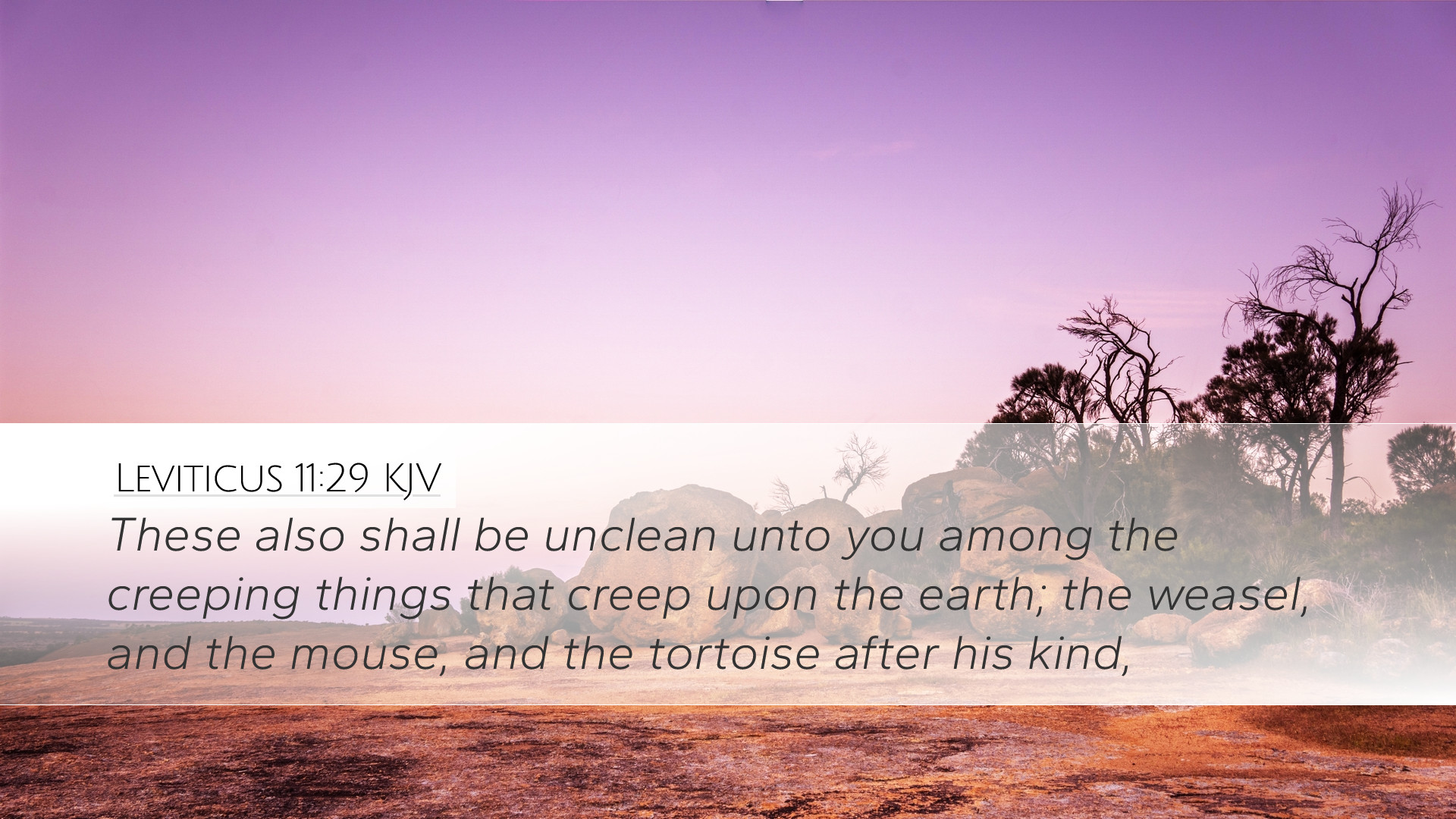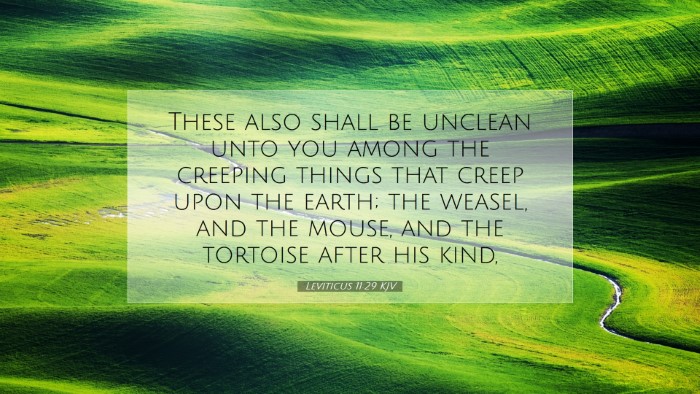Commentary on Leviticus 11:29
Verse: "These also shall be unclean to you among the creeping things that creep upon the earth: the weasel, and the mouse, and the tortoise after his kind."
Overview of Leviticus 11
The Book of Leviticus primarily focuses on the laws of ritual purity and the significance of holiness in the life of Israel. Chapter 11 delineates the dietary laws, distinguishing between clean and unclean animals. This serves not merely as regulation but as spiritual instruction for the Israelites, shaping their identity as God's chosen people.
Verses Contextual Analysis
The specific mention of "creeping things" in Leviticus 11:29 calls attention to various small creatures which were deemed unclean. This verse is part of the broader classification that teaches the children of Israel about maintaining purity and separation from that which is profane. The criteria for clean and unclean animals reflect God’s concern for order and holiness.
Insights from Matthew Henry
Matthew Henry highlights the importance of the laws regarding clean and unclean animals as a means of pointing Israel to moral and spiritual truths. He notes that the creatures listed in this verse reflect a broader theological principle: that the chosen people of God should refrain from participating in behaviors and practices that defile or corrupt. Henry suggests that these laws were intended to elevate the Israelites above the practices of surrounding nations.
Insights from Adam Clarke
Adam Clarke offers a detailed examination of the specific animals mentioned in this verse. He points out that the weasel and mouse are often associated with destruction, and thus their designation as unclean serves as a symbolic lesson on purity. Clarke emphasizes that these designations are meant to instruct the Israelites concerning their relationship with God—promoting cleanliness not just in a physical sense but spiritually, as a representation of moral integrity.
Insights from Albert Barnes
Albert Barnes elucidates the significance of the creeping things mentioned in Leviticus 11:29. He discusses how these regulations reflect a broader theme in the Torah, contending that the distinctions between clean and unclean have implications for the sanctity of the people. Barnes notes that the use of "creeping" might suggest a more general reference to things that bring about spiritual and physical contamination, reiterating the need for Israel to maintain separateness as a holy nation before God.
Theological Implications
Understanding Leviticus 11:29 invites scholars and theologians to explore the broader ramifications of purity laws in relation to moral and spiritual conduct.
- Separation from Defilement: The unclean animals signify a deeper call to the Israelites to maintain a distinct identity, not only through dietary laws but in their entire way of life.
- Symbolism of Purity: The characteristics of these creatures serve as metaphors for sin and corruption, encouraging the community to avoid complacency in moral living.
- The Holiness of God: These laws reflect God’s nature, urging His people to emulate holiness in their actions—setting a precedent for Christian moral teachings that follow.
Practical Applications for Today
For pastors and students of the Word, Leviticus 11:29 and its surrounding context reveal essential truths about the character of God and His call to holiness. The dietary regulations inspire reflection on contemporary issues of moral living and ethical discernment.
- Personal Reflection: Believers are encouraged to examine their lives for areas where purity may be compromised, considering not only external behaviors but internal attitudes.
- Community Integrity: The concept of corporate holiness challenges churches to foster environments that reflect Christ's teachings and uphold moral standards.
- Emphasis on Wholeness: The call to cleanliness resonates with the New Testament emphasis on spiritual nourishment and the call to live distinctively in a world filled with spiritual contamination.
Conclusion
Leviticus 11:29 serves as a poignant reminder of God's desire for His people to reflect His holiness in both the physical and spiritual realms. By examining the insights from historic commentaries, contemporary readers can embrace the enduring principles of purity and separation while cultivating deep roots in their faith community.


